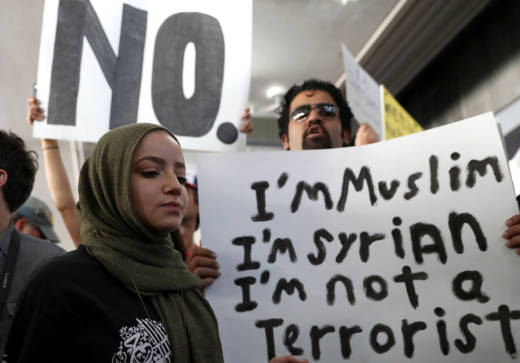Administration officials left open the possibility that other countries could be added to future visa bans, or that countries currently on the list could be removed.
The new order has a delayed implementation, designed to avoid the chaotic situation created by the initial order with people in transit when their visas were nullified.
It also omits a section about prioritizing refugees of minority religions — the part of the initial order that, as NPR's Domenico Montanaro has reported, "indicates prioritizing Christians," and was one reason the order was challenged as a form of "Muslim ban."
The White House continues to defend the first order as legal and appropriate, even as it's being replaced by the new order.
That original order prompted chaos at airports and inspired protests — and dozens of lawsuits.
The suits were filed by "doctors, professors, students, people fleeing violence and Iraqis who have worked for the U.S. military," as NPR's Joel Rose and journalist Parker Yesko reported last month. They continued:
"Some [of the plaintiffs] were detained in American airports for hours over the weekend; others were barred overseas from boarding planes bound for the U.S. Two Syrian brothers with visas to enter the country say they were turned around at Philadelphia International Airport and sent back to Damascus.
"Human rights organizations and attorneys general in five states jumped aboard some of the suits, and their lists of legal grievances were long. They alleged violations of the First, Fifth and 14th Amendments, which guarantee religious equality, due process and equal protection under the law, as well as denials of asylum and discriminatory visa processing."
One of the suits, brought by the state of Washington and joined by the state of Minnesota, prompted a federal judge to issue a nationwide temporary stay of Trump's executive order.
The Department of Justice challenged the stay in an appeals court, but a panel of three judges upheld the judge's decision. As a result, the initial executive order has not been in effect for more than a month.
The new order is intended to address "many of the court's concerns," according to an administration official. But it's not likely to be the end of legal challenges.
"I think everyone -- and I assume the government as well -- expects that there will be a new round of litigation," Omar Jadwat, director of the Immigrants' Rights Project at the ACLU, told NPR before the new order was released.
Concerns about the travel ban will continue "whether they're repackaged in a new order or not," he says.
Meanwhile, the issuance of a new executive order doesn't spell the end of lawsuits against the old order.
White House press secretary Sean Spicer has repeatedly said the administration plans follow a "dual track" strategy of continuing to defend the old order from legal challenges even as a new order replaces it.
But a senior official at the Department of Justice told reporters on Monday that the DOJ believes the new order will make a majority of the pending cases moot.
Judges might not necessarily be persuaded by the Justice Department's arguments on that front, says Catherine Kim, a law professor at the University of North Carolina Law School. She joined other law professors in signing an amicus brief against Trump's initial order, and spoke to NPR before the new order was announced.
Even for cases where the original complaint is no longer an issue under the new order — like, for instance, a case involving a legal permanent resident — "the courts may be worried that as soon as the case is dismissed the administration would just go back and reissue the [original] executive order," Kim says.
Other, broader challenges to the original order could apply equally to the new order, she says — such as the allegation that the order was "done in bad faith," she says.
"I don't think that there is anything that the new executive order could do to address concerns raised by the courts [that] this was really motivated by animus, not by national security concerns," she says.
The Trump administration maintains that it will eventually triumph in the legal battle over the original executive action, based on the president's broad authority on immigration issues. Some legal scholars, including Alan Dershowitz, believe the administration could win at least a partial victory on those grounds.
"I don't think the ban is unconstitutional as it affects a family in Yemen who has had no contact with the United States and simply applies for a tourist visa to come see the Statue of Liberty," he told NPR in early February. But, Dershowitz said, other elements of the ban — especially the initial interpretation that it applied to green card holders — are harder to defend.
The issue could eventually end up before the U.S. Supreme Court.

